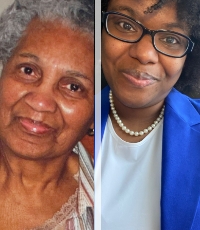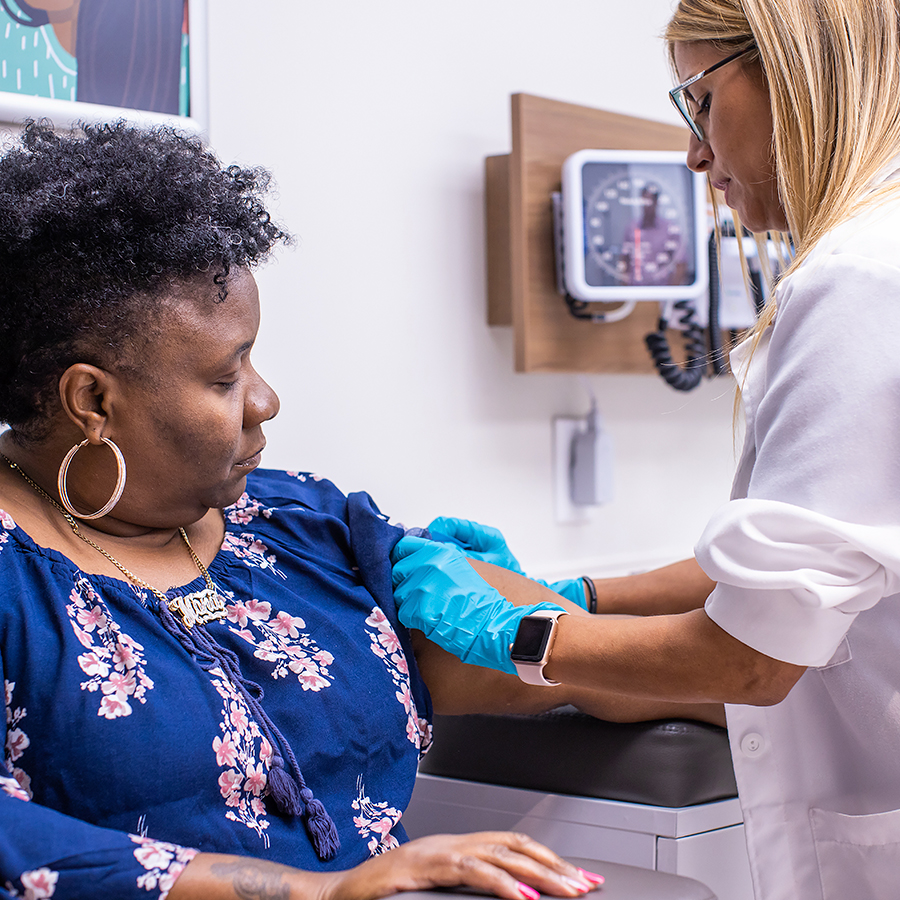
“I want to be a part of creating a pathway that allows people who look like me to have the opportunity to consent—to say, ‘Yes, I want to participate,’ or, ‘No, I don’t’—and the ‘no’ is respected,” said Eboni Winford, Ph.D., MPH., All of Us principal investigator and director of research and health equity at Cherokee Health Systems.
Key Facts
- Eboni’s experience caring for others drew her to the All of Us Research Program, where she helps make strides toward advancing health research.
- Eboni was inspired by both the All of Us goal to partner with people who reflect the diversity of the U.S. and the in-depth consent process that offers multiple avenues for people to engage.
- In her own times of crisis, the culture of care present in the All of Us Research Program keeps her engaged and committed.
Dr. Winford has been helping to care for others since childhood. She grew up in Norfolk, Virginia, with her single mom and her maternal grandmother. Her grandmother, whom she called Ms. Loretta, ran a small daycare in their home, charging minimally to help local families with childcare. Dr. Winford remembers that as a young girl, she worked alongside Ms. Loretta in the kitchen preparing lunches for the children.
“I was raised with a heart for service,” Dr. Winford said.
That sense of shared mission motivated Dr. Winford—now a licensed psychologist—to join Cherokee Health Systems in Tennessee in 2013 and later to become a lead project director and participant of the All of Us Research Program.
Creating Pathways for Diversity and Inclusion in Biomedical Research Through Community Partnerships
Engaging diverse communities in biomedical research, reaching people who have been marginalized, and building trust are among the goals shared by Cherokee Health and All of Us.
Cherokee Health is one of 22 Federally Qualified Health Centers (FQHCs) partnering with All of Us. FQHCs receive federal funds to provide care to populations often disconnected from the health care system.
FQHCs have been pivotal partners to All of Us, helping ensure that the program is engaging people who reflect the country’s diversity. Among All of Us participants who have completed the initial steps of the program, 80% are from communities that have historically been underrepresented in biomedical research, including LGBTQ+ people, people living in rural areas, older adults, and participants with lower income and limited educational attainment. Nearly 50% of participants identify with a racial or ethnic minority group.
“The history of medicine in the United States is messed up,” Dr. Winford said. “When we think about how we have a medication or a treatment, a lot of the discovery was done through people without their consent. Many were harmed by the research.
“I can’t complain about our history and our system of medicine if I’m going to sit on the sidelines. I want to work on doing something about it. I want people to fully understand what they are saying yes to and know they can participate in many different ways.”
Dr. Winford applauds the program’s in-depth consent process, which offers participants multiple avenues to engage, including providing blood or saliva samples, completing online surveys, and sharing electronic health records and wearable data. The program provides potential participants with information about the program’s goals, how it operates, and what to expect after joining.
This information allows people to make informed decisions about enrollment. Dr. Winford readily explains to patients what they may choose to get in return for joining, such as information about their genetic ancestry and health-related genetic results.
Shared Mission and Purpose
The core philosophy of care at Cherokee Health continues to excite and inspire Dr. Winford.
“We will see anybody regardless of their ability to pay, and we will never send anybody to collections if they can’t afford their bill,” Dr. WInford said. “They came here for care.”
Dr. Winford’s experiences at Cherokee Health illustrate a continued commitment to care for patients and increase patient access to health care. The staff are very aware of the challenges many patients face getting to their appointments, such as transportation problems or other barriers.
One example of Cherokee’s commitment to improve patient care and access is the distribution of digital blood pressure monitoring devices. Patients diagnosed with high blood pressure – hypertension – were given a monitor with instructions to use at home.
“We know the link between hypertension and the risk of other cardiovascular complications, such as heart failure, stroke, heart disease,” Dr. Winford said. “We are determined to do our part to reduce that risk as much as possible.”
Heart disease is the number one cause of death in the United States. In Tennessee, a total of 960 All of Us participants reported a diagnosis of heart disease and are sharing a broad range of health information with All of Us researchers to advance knowledge on ways to prevent, detect, and treat heart disease.
Cherokee Health has distributed more than 6,800 blood pressure monitors to patients beginning in November 2023 through early 2024. The initiative to improve wellness and cardiovascular health among patients hits home for Dr. Winford.
“This is hereditary for me,” Dr. Winford said. “Hypertension was the only medical condition Ms. Loretta had when she passed away. It’s the only one my mom and I also have.”
Many patients Dr. Winford works with have limited access to the Internet and low digital literacy. Her team assists people individually at local clinic sites to help them sign up online, complete surveys, and access information in the participant portal. Dr. Winford hopes to extend that access by providing participants with phone cards so they have data access at home.
Mentorship
The first in her family to graduate from college, Dr. Winford is grateful for the opportunities that teachers and mentors extended to her along her career path. “All my life, paths have been open to me because someone saw me,” she said. “I make it my business to see others, especially those I supervise, so they are taken care of.”
Dr. Winford credits a high school guidance counselor with encouraging her to apply to Duke University and providing scholarship applications. While at Duke, she took a psychology class and was convinced the field was her future. Later, a Duke professor encouraged her to apply for the University of North Carolina at Chapel Hill’s Moore Undergraduate Research Apprentice Program, a paid summer fellowship designed to encourage talented students from diverse backgrounds within the humanities, social sciences, and fine arts to pursue Ph.D. programs.
Dr. Winford applied and was accepted—and also met the man she would later marry: Brandon Winford, Ph.D., now a history professor at the University of Tennessee. They both completed their doctoral degrees at the University of North Carolina.
A Culture of Caring
Shortly after she joined Cherokee Health, Dr. Winford learned that her older sister had passed away. It was around the same time that Cherokee Health became an FQHC partner with All of Us. Processing the sudden loss was challenging, but Dr. Winford said she found healing through her work with colleagues and the mission of All of Us.
“When we talk about reaching underrepresented populations in biomedical research, that is by definition our patient population,” Dr. Winford said. “Working with All of Us allowed me to focus my energy on making the program the best it could be for our patients,” Dr. Winford said. “It was right up my alley and really helped me heal.”
Then, in early 2022, Dr. Winford’s beloved Ms. Loretta fell and needed care, and Cherokee staff supported Dr. Winford as she took leave to live with and care for her grandmother for several weeks. One night, after not eating for a few days, Ms. Loretta asked for mashed potatoes and gravy. Dr. Winford was delighted and shared her excitement with colleagues at Cherokee, who immediately took action.
“Do you know what showed up on our doorstep?” Dr. Winford said. “Enough mashed potatoes and gravy to feed a family for a week.” The staff repeatedly checked on Dr. Winford to make sure she was eating and had what she needed. When Dr. Winford texted her supervisor in the middle of the night to let her know her grandmother had passed, she got an immediate response. Being able to care for her grandmother as she transitioned peacefully was extremely important to Dr. Winford.

“She was there for my first breath, and I was there for her last,” Dr. Winford said. “Not once did I need to ask the staff for anything. They said, ‘You’re taking care of your grandmother; we’re going to take care of you.’”
That mutual circle of care is what has kept Dr. Winford engaged and committed throughout her life. Dr. Winford recently met with the first participant she recruited to All of Us, who she said remains a motivated and enthusiastic participant.
“I’ve seen the excitement,” Dr. Winford said, sharing the enthusiasm. One of the key reasons, she added, is a culture of caring—caring that everyone has a voice. “Participants have told us they have never had the chance to be a part of something like this.”
Share your story with All of Us
If you would like to recommend someone to be featured, please submit a suggestion to All of Us.
Are you Interested in the All of Us Research Program?
- Learn about participation in the program.
- Learn about opportunities for researchers.


